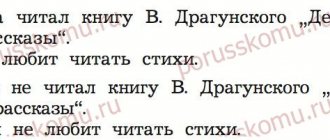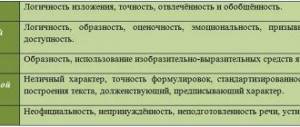Verbs of II conjugation and their exceptions
To learn how to identify the second conjugation of verbs, it is enough to know what personal endings they will have:
| Persons | ||||
| Numbers | 1st | 2nd | 3rd | |
| The only thing | -у(-у) | -hey | -it | |
| Plural | -them | -ite | -yat (-at) | |
The word needs to be conjugated, that is, changed according to persons and numbers, in order to see the necessary endings and correctly determine the conjugation.
The table below provides a visual representation of examples.
| Persons | |||||
| Numbers | 1st | 2nd | 3rd | ||
| The only thing | I'm flying | you're flying | He/she/it is flying | ||
| Plural | We are flying | you're flying | They're flying | ||
There are also verbs of the 2nd conjugation, which are exceptions. In order not to make mistakes, it is advisable to memorize them: twirl, drive, hold, look, see, offend, hate, depend, endure, breathe, hear.
In the initial form they all end in –ат and –еть, so they seem to belong to the 1st conjugation. However, it is easy to check which conjugation a verb belongs to if you simply conjugate it.
Examples:
- see
(see
, see
it
, see
them
, see
it
, see
you
, see
it
); - twirl
(twirl
, twirl
,
twirl
,
twirl
,
twirl
,
twirl
)
.
Irregular verbs of the English language - table with translation, grade 4
| Infinitive verb form | Past Simple verb form | Approximate pronunciation | Translation |
| was (singular), were (plural + pronoun you) | bi – voz/ver | to be – was, were | |
| become | became | bikam – bikaim | become – became |
| begin | began | bagin – bagan | to begin, begin - started, started |
| break | broke | break - broke | break - broke |
| bring | brought | bring - brout | bring - brought |
| build | built | build - build | build, construct – built |
| buy | bought | buy-boat | buy – bought |
| can | could | ken – where | be able to, be able to - could, was able to |
| catch | caught | ketch - kout | catch, grab - caught, grabbed |
| choose | chose | chuuz – choz | choose - chose |
| come | came | kam – kame | come, come - came, arrived |
| cut | cut | kat - kat | cut - cut |
| do | did | du – did | do, do – did, did |
| draw | drew | drow–drew | draw – drew, painted |
| drink | drank | drink - drank | drink - drank, drank |
| eat | ate | it - eith | eat - ate, ate |
| fall | fell | foul - foul | fall - fell |
| feed | fed | feed - fed | feed - fed, fed |
| feel | felt | fil – felt | feel – felt |
| find | found | find - found | find – found |
| fly | flew | fly - fly | fly - flew away, flew |
| forget | forgot | foget – fogot | forget - forgot |
| forgive | forgave | fogive - fogave | forgive - forgiven |
| freeze | froze | frieze – froz | freeze, freeze - frozen, froze |
| get | got | get - goth | receive – received |
| give | gave | give - gave | give - gave |
| go | went | go - vent | go - left, walked |
| have | had | have - head | have – had, owned |
| hear | heard | hie – het | hear – heard |
| keep | kept | kip – capt | store - kept |
| know | knew | know - nude | know - knew |
| leave | left | liv – left | leave, leave - left, left, left |
| make | made | make-made | do – did |
| put | put | put - put | put, put - put, put |
| run | ran | ran – ren | run - ran, ran away |
| read | read | read - ed | read – read |
| say | said | say – sayd | say - said |
| see | saw | si – sou | see - saw, saw |
| sit | sat | sit – set | sit - sat down, sat |
| sleep | slept | slip – slapt | sleep - slept |
| speak | spoke | spik – spoke | speak - spoke |
| spend | spent | spand – spant | spend - spent |
| stand | stood | stand - studio | stand – stood |
| steal | stole | style - table | steal, steal - stole, stole |
| stick | stuck | stick - stick | stick - pasted |
| swim | swam | swim - swam | swim - swam |
| take | took | take - knock | take - took |
| teach | taught | tich-tout | teach – taught, taught |
| tell | told | tel – tell | tell - told |
| think | thought | son - south | think - thought, thought |
| throw | threw | srow - sryu | throw, throw - threw, threw |
| understand | understood | andestand – andestud | understand - understood |
| wake | woke up | wake - wok | wake up, wake up - woke up, woke up |
| wear | wore | vie – voor | wear – wore (clothes) |
| write | wrote | wright – route | write – wrote, wrote |
Try to test your knowledge, take the English irregular verbs test!
This is what the list of irregular English verbs looks like, which 4th graders should memorize. And we’ll talk about how to do this efficiently and quickly in the next section.
Other English topics: English words for children - basic phrases and words for all occasions
Verbs of I conjugation and their exceptions
It is very easy to accurately learn to identify verbs of the 1st conjugation. It is enough just to memorize the following endings: -yu(-u), -eat(-eat), -et(-et), -e(-em), -ete(-yote), -yut(-ut).
Examples:
- I sweep, you sweep, he/she sweeps, we sweep, you sweep, they sweep;
- I dig, you dig, he/she digs, we dig, you dig, they dig;
- I live, you live, he/she lives, we live, you live, they live;
- I rent, you rent, he/she rents, we rent, you rent, they rent;
- I weave, you weave, he/she weaves, we weave, you weave, they weave.
Special words of the 1st conjugation consist of only 2 exception verbs:
shave
and
lay
.
They are very easy to confuse with the 2nd conjugation, because the suffix -т is preceded by the letter “I”, which usually indicates verbs of the 2nd conjugation. Check: shave - shave, shave, shave, shave, shave, shave.
However, the verb to lay is special; it is used exclusively in the form of the infinitive or past tense. Personal forms of the word lay can only be formed from the verb stlat.
How to determine verb conjugation in Russian
In Russian, conjugation can be identified in two ways:
- at the end (if it is in the stressed position);
- by suffix (if the ending is in unstressed position).
Method for identifying conjugation by stressed ending
Examples:
- oven – you bake, she/he bakes, they bake
(1); - scream - you scream, she/he screams
(2);
- command - you command, she/he commands, they command
(2);
- flow - you flow, she/he flows, they flow
(1);
- be silent - you are silent, she/he is silent, they are silent
(2);
- conceal – you conceal, she/he conceals, they conceal
(2);
- burn - you burn, she/he burns, they burn
(1).
In order to reveal conjugation in this way, it is necessary to change the verb in numbers and persons, because the infinitive does not indicate conjugation.
Examples:
- pour - pour, pour
(1 reference);
- burn - burn, burn
(2 references);
- wash - wash, wash
(1 reference);
- dig - dig, dig
(1 reference),
noisy - noisy, noisy
(2 references).
You can determine how a verb with a personal ending in an unstressed position is conjugated by the suffix.
To identify conjugation, verbs should be put in the infinitive
(initial or indefinite form), and then look carefully at the letter that is in front of -т.
Examples:
- shoots - shoot;
- crackles - crackles;
- blinks - blink;
- wallow - to wallow;
- jerks - jerks;
- tempers – hardens;
- tramples - trample;
- meanders - meanders;
- I blame - blame;
- I command - to command;
- substitute - substitute;
- bury - bury;
- construct - construct.
So, let's draw conclusions:
- The following questions will help you accurately raise a verb to its initial form: “What to do?”, “What to do?”;
- 1 includes those words that end in -ot, -ity, -t, -et, -ut, -yat when raised to the initial form;
- The 2nd category includes those that, when elevated to the infinitive, end in -it; they are always easy to recognize.
Notes and presentation for a Russian language lesson in 4th grade on the topic “Exception Verbs”
The lesson conducted on the topic “Verbs - exceptions” is the final stage of studying the topic “Verb” in 4th grade.
This is a “Lesson in mastering new knowledge” using level differentiation technology. Since we work in classes whose occupancy does not exceed 10 people, this allows us to plan work individually with each student, taking into account his psychological characteristics. Subject: "
Verbs are exceptions”
Lesson objectives:
• to introduce exception verbs;
• develop the ability to recognize them in the text and correctly write their unstressed personal endings. Lesson objectives:
Educational: • develop the ability to correlate the tense form of a verb with its initial form; • improve the ability to recognize the conjugation of a verb using an indefinite suffix; • consolidate the skill of writing unstressed personal endings of verbs. Developmental: • develop cognitive and creative abilities, the ability to work in groups and individually; • improve speech culture; • instill a love for the creativity of A.S. Pushkin. Educational: • developing interest in Russian language lessons, the ability to predict, organize and evaluate one’s activities. • cultivate decency and form the correct concept of friendship. Equipment: screen, projector, poetic methods of memorization (visual aids), task cards.
During the classes
I. Report the topic of the lesson. (slide 1) Teacher: Who declares themselves like that? What are objects without me? Only names. And I will come - Everything will come into action - a rocket is flying, People are building buildings, gardens are blooming, And bread is growing in the fields. Children: Verb. Teacher: Today we will 1) continue to learn how to determine the conjugation of verbs; 2) correctly write unstressed endings of verbs; 3) let's get acquainted with verbs that are exceptions to this rule. II. Calligraphy. Teacher: The epigraph of our lesson will be the proverb (slide 2) He who sees and hears a lot knows a lot. Teacher: How do you understand it? Pay attention to the correct combination of the letters “sl” and write the proverb beautifully. (The teacher ensures that the writing is neat and correctly positioned). III. Vocabulary work Teacher: Write down the verb. Fill in the missing letter. Check the accent. (slide 3) ott. chit - sharpen otb. press – run rel. sti - carried Teacher: Where are the unstressed vowels? (Fundamentally). – What part of speech do the written words belong to? (Verbs). – What is called a verb? (Denotes the action of an object; is the main member in a sentence; answers the questions: “what did”, “what is doing”, “what will do”). – How are these verbs similar? (These are verbs in the initial form - infinitive). – What form of the verb is this? What is her role? 1) infinitive + “will” = future tense; 2) expresses emotions and feelings (to love, to be indignant, to suffer, to roar); 3) when determining the unstressed personal ending of verbs, you can confuse -e and -i: -it (II), -et (I). III. Individual multi-level tasks to monitor the assimilation of what has been learned. Option 1 (with a low level of development) Write down the verbs in the indefinite form, determine their conjugation. He ran, he sings, he drinks, he walks, he walks, he thinks, he flies, he learns, he laughs, we talk, he takes. Option 2 (with an average level of development) In the first column, write down verbs that indicate how people move. The second contains verbs that indicate how animals move. The third contains verbs related to teaching. Determine their conjugation. Walk, run, crawl, flutter, swim, teach, count, write, read. Option 3 (with a high level of development) For stable combinations, select a verb that is close in meaning, write it in the indefinite form, and determine the conjugation. Stroke the head -..., hang the head -..., cut it on the nose -..., beat the thumbs -... er, put your teeth on the shelf -... . Teacher: Let's check how you completed the task. (slide 4) Raise your hands who did not make a single mistake, one mistake, two. Evaluate your own work. IV. Statement of the problem Teacher: Tatyana Rick offers us a comic poem, let's read it: (slide 5) In order to shave the neighbor's chicken cleanly bald, you need to lay two napkins on the stool. Teacher: Why shave the unfortunate chicken? This is a joke, but it contains exception verbs in - it, which belong to the I conjugation. There are only two such verbs: “to shave” and “to lay.” (2 students work at the board. Change these verbs by person. The rest of the students work in notebooks. Use a pencil to highlight the endings of the verbs). Indefinite form 2nd person, singular 3rd person, plural Shave You will shave (shave) They will shave (shave) Indefinite form 2nd person, singular 3rd person, plural Make a bed You will make a bed (you will make a bed) You will make a bed (you will make a bed) Teacher: Are you finished? Let's conduct a self-test according to the rules. (slide 6) Algorithm for determining the unstressed ending of a verb. 1. Put the verb in the infinitive form. 2. Determine its conjugation by the vowel letter before -т. 3. Determine the vowel at the end of the verb of this conjugation. V. Children discovering the topic of the lesson Teacher: Why is the task similar to the previous one, but the answers are different? Why didn't you cope right away? You used a previously studied algorithm. This means that these are special words, special verbs that do not obey these rules, i.e. These are exceptions to the rules. Today we will get acquainted with verbs that do not obey these rules, i.e. with verbs - exceptions. (slide 7) (The teacher reads a poem and along the way, exception verbs appear on the screen). Verbs in the indefinite form in - it, friends, must be classified as the second conjugation. Don’t forget to include exceptions in this conjugation: Drive, hold, Look and see, Breathe, hear, hate, And depend, and twist, And offend, and endure. You remember, friends, they cannot be conjugated with “e”. VI. Independent grouping by suffixes and writing verbs in a notebook. Checking the notebook entries according to the table (slide VII. Physical exercise for the brain and eyes. 1. Students stretch their arms forward and with both hands simultaneously write out horizontal figure eights to the left, right; in different directions of hand movement. 2. Children look at the tip of the nose, into the distance, left, right, up, down, write vertical and horizontal figure eights with your eyes. VIII. Consolidating knowledge about exception verbs. Teacher: And now, together with the heroes of A.S. Pushkin’s fairy tales, we will consolidate knowledge of exception verbs. Reasoning according to the algorithm: (slide 9) A) We put emphasis: is the ending stressed or not?
(slide 1) Teacher: Who declares themselves like that? What are objects without me? Only names. And I will come - Everything will come into action - a rocket is flying, People are building buildings, gardens are blooming, And bread is growing in the fields. Children: Verb. Teacher: Today we will 1) continue to learn how to determine the conjugation of verbs; 2) correctly write unstressed endings of verbs; 3) let's get acquainted with verbs that are exceptions to this rule. II. Calligraphy. Teacher: The epigraph of our lesson will be the proverb (slide 2) He who sees and hears a lot knows a lot. Teacher: How do you understand it? Pay attention to the correct combination of the letters “sl” and write the proverb beautifully. (The teacher ensures that the writing is neat and correctly positioned). III. Vocabulary work Teacher: Write down the verb. Fill in the missing letter. Check the accent. (slide 3) ott. chit - sharpen otb. press – run rel. sti - carried Teacher: Where are the unstressed vowels? (Fundamentally). – What part of speech do the written words belong to? (Verbs). – What is called a verb? (Denotes the action of an object; is the main member in a sentence; answers the questions: “what did”, “what is doing”, “what will do”). – How are these verbs similar? (These are verbs in the initial form - infinitive). – What form of the verb is this? What is her role? 1) infinitive + “will” = future tense; 2) expresses emotions and feelings (to love, to be indignant, to suffer, to roar); 3) when determining the unstressed personal ending of verbs, you can confuse -e and -i: -it (II), -et (I). III. Individual multi-level tasks to monitor the assimilation of what has been learned. Option 1 (with a low level of development) Write down the verbs in the indefinite form, determine their conjugation. He ran, he sings, he drinks, he walks, he walks, he thinks, he flies, he learns, he laughs, we talk, he takes. Option 2 (with an average level of development) In the first column, write down verbs that indicate how people move. The second contains verbs that indicate how animals move. The third contains verbs related to teaching. Determine their conjugation. Walk, run, crawl, flutter, swim, teach, count, write, read. Option 3 (with a high level of development) For stable combinations, select a verb that is close in meaning, write it in the indefinite form, and determine the conjugation. Stroke the head -..., hang the head -..., cut it on the nose -..., beat the thumbs -... er, put your teeth on the shelf -... . Teacher: Let's check how you completed the task. (slide 4) Raise your hands who did not make a single mistake, one mistake, two. Evaluate your own work. IV. Statement of the problem Teacher: Tatyana Rick offers us a comic poem, let's read it: (slide 5) In order to shave the neighbor's chicken cleanly bald, you need to lay two napkins on the stool. Teacher: Why shave the unfortunate chicken? This is a joke, but it contains exception verbs in - it, which belong to the I conjugation. There are only two such verbs: “to shave” and “to lay.” (2 students work at the board. Change these verbs by person. The rest of the students work in notebooks. Use a pencil to highlight the endings of the verbs). Indefinite form 2nd person, singular 3rd person, plural Shave You will shave (shave) They will shave (shave) Indefinite form 2nd person, singular 3rd person, plural Make a bed You will make a bed (you will make a bed) You will make a bed (you will make a bed) Teacher: Are you finished? Let's conduct a self-test according to the rules. (slide 6) Algorithm for determining the unstressed ending of a verb. 1. Put the verb in the infinitive form. 2. Determine its conjugation by the vowel letter before -т. 3. Determine the vowel at the end of the verb of this conjugation. V. Children discovering the topic of the lesson Teacher: Why is the task similar to the previous one, but the answers are different? Why didn't you cope right away? You used a previously studied algorithm. This means that these are special words, special verbs that do not obey these rules, i.e. These are exceptions to the rules. Today we will get acquainted with verbs that do not obey these rules, i.e. with verbs - exceptions. (slide 7) (The teacher reads a poem and along the way, exception verbs appear on the screen). Verbs in the indefinite form in - it, friends, must be classified as the second conjugation. Don’t forget to include exceptions in this conjugation: Drive, hold, Look and see, Breathe, hear, hate, And depend, and twist, And offend, and endure. You remember, friends, they cannot be conjugated with “e”. VI. Independent grouping by suffixes and writing verbs in a notebook. Checking the notebook entries according to the table (slide VII. Physical exercise for the brain and eyes. 1. Students stretch their arms forward and with both hands simultaneously write out horizontal figure eights to the left, right; in different directions of hand movement. 2. Children look at the tip of the nose, into the distance, left, right, up, down, write vertical and horizontal figure eights with your eyes. VIII. Consolidating knowledge about exception verbs. Teacher: And now, together with the heroes of A.S. Pushkin’s fairy tales, we will consolidate knowledge of exception verbs. Reasoning according to the algorithm: (slide 9) A) We put emphasis: is the ending stressed or not?
B) Is it an exception verb? C) Determine the conjugation. Find the exception verb in the passage and write it down. Find the exception verb in the passage and determine its conjugation. Find the exception verb in the passage and write it in the 2nd person singular form. 1. “He just approaches the sea, And then he hears as if a groan...” 2. “He looks and sees, the action is dashing: A swan is beating among the swells...” 3. “He feeds and waters them, And orders them to keep the answer...” 4. “ He turned into a mosquito, flew and squealed, caught up with the ship at sea...” 5. “And the queen laughed, And shrugged her shoulders, And winked with her eyes, And clicked her fingers, And twirled, akimbo, Looking proudly in the mirror...” 6. “Her elbows were tightly tied , The beast will fall into the claws, She will endure less, It will be easier to die...” 7. “As if under the wing of sleep, She lay so quiet, fresh, That she just couldn’t breathe...” Teacher: What fairy tales did you hear excerpts from? (“The Tale of Tsar Saltan, his glorious son and the mighty hero Prince Gvidon Saltanovich and the beautiful Swan Princess”, “The Tale of the Dead Princess and the Seven Knights”) (slide 10) Checking the notes in the notebook for level 3 students: You hear, you look, you see, you hold, you catch up, you turn, you endure, you breathe. IX. Lesson summary. • What was the topic of the lesson? • What problem did you encounter? • Exception verbs of the 1st conjugation. • Exception verbs of the 2nd conjugation. • Why are these verbs exceptions? • How can they determine their conjugation? • Name the exception verbs in the lesson epigraph. Method of memorization I came from school, I am learning verbs, It’s a trifle for me to learn them! I have my own method! It is used like this, this new method: Scream - I scream, Twirl - I twirl, Move - I move, Jump - I jump. I jumped! I moved it! I stomped! I sang! I sang while we were in the hallway. Suddenly the bell did not ring! ... I open it, our neighbor (he lives below us) Not combed, not dressed - In slippers and pajamas. He shouts: “I beg your pardon! Is this an earthquake? Or maybe elephants are settled above me? – Dear neighbor, There is no one in the apartment. I came from school and am learning verbs... (V. Voskoboynikov) Teacher: I hope that when you learn verbs, your neighbors will not suffer from you. X. Homework: Learn exception verbs. Level 1. Make up a phrase with each exception verb in the indefinite form. Level 2. Put each exception verb in the 2nd person singular form and create a phrase with it. Level 3. Write a mini-essay “An Incident with a Friend” using exception verbs. XI. Assessing students' work in class. (slide 11) For the full text of the material, notes and presentation for a Russian language lesson in 4th grade on the topic “Exception Verbs,” see the downloadable file
. The page contains a fragment.
| Author: Slivka Irina Aleksandrovna → Solnyshko2316 12/01/2010 9 64105 8063 | Comment |
Thank you for your mark. If you want your name to be known to the author, log in to the site as a user and click Thank you again. Your name will appear on this page.
Login | Registration
Have an opinion? Leave a comment
Variably conjugated verbs
Heterogeneously conjugated verbs are special verbs that change in person and number and at the same time acquire endings of both the 1st conjugation and the 2nd.
Similar verbs include: want, run.
Let's analyze:
- want
– as in 1st: I want (I), want (you), wants (he); as in the 2nd: we want (we), want (you), want (they);
- run
– as in the 1st: they are running; as in the 2nd: I run, you run, he runs, we run, you run.






